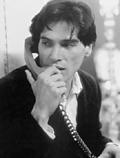- The Nice Boys, “You Won’t See Me Anymore” (Discourage).
- Spoon, “Decora” (The Believer, June issue).
- The White Stripes, “My Doorbell” (V2). iTunes
- Gianmaria Testa, “Dentro al Cinema” (Putumayo; originally released 2003).
- The Rogers Sisters, “Les Fantaisies Sont Bien” (Troubleman Unlimited).
- DJ Lance Lockarm, “Sheilium” (www.kuci.uci.edu/~brianm/lancelockarm).
- Entombed vs. OutKast, “B.O.B.” (MP3).
- Shir Khan, “Sean Says Phoenix Is Everything” (Broken Bootlegs).
- Lady Sovereign, “Tango” (Casual).
- Prodigal Sunn ft. Scotty, “Lovely Ladies” (Free Agency).
- Steve Reich & Musicians, “Drumming, Pt. 4 (Live at the Kitchen, 1977)” (Orange Mountain). iTunes
- Jeff Samuel, “Endpoint” (Trapez). Kompakt
- The Field, “Love vs. Distance” (Kompakt). Kompakt
- Gusto, “Disco’s Revenge” (Disky); originally released 1994).
- Infiniti, “Game One” (Tresor; originally released 1994).
A month ago, on Wednesday, June 8, five employees of Mondo Kim’s, a book, movie, and music store in New York’s East Village, were arrested and held overnight following a raid by the Recording Industry Association of America, one day after it announced its intention to stop the sale of “pirated CDs.” This is certainly understandable—in New York City, you don’t have to walk far to find a corner with someone tending a blanket covered with burned CD-Rs of current hit albums, housed in slimline cases with badly photocopied covers. The problem is that the RIAA’s idea of pirating extends to what the rest of us refer to as mixtapes—not the homemade type this column celebrates so much as the kind that butters hip-hop DJs’ bread.
What’s striking about the event isn’t that it occurred, but where. The selection and clientele at Kim’s range widely, but it’s hardly a hip-hop store. When mixtapes blew up thanks to 50 Cent (who made his name on a series of mixtapes) and DJ Kayslay (whose 2003 Columbia album, The Streetsweeper, rode the crest into Wal-Mart), nonadepts like myself became interested, and Kim’s began carrying them to meet that interest. Compared to the rest of the mixtape market, including several New York shops, Kim’s was relatively small fry; busting the store for carrying them was like sending someone up for carrying a one-hitter in their suitcase.
The irony here is that mixtapes are good for the record business. As SW contributor Oliver Wang once wrote of Kayslay, mixtapes are “no longer like albums; they, in essence, are albums, both in terms of how the industry helps produce them and in how fans receive them.” This isn’t just because they recombine existing elements, either. A mixtape’s popularity is often directly proportional to the number of exclusive tracks, freestyles, and outtakes they contain, and as 50 Cent and the Diplomats have shown, they’re a terrific showcase for talent that can go on to make the industry money—in 50’s case, serious money. Besides, anyone buying a mixtape to hear their favorite song is begging to be disappointed, because chances are the song will only be a minute-and-a-half long. (Most mixtapes contain between 20 and 35 songs.)
This mix contains three mash-up bootlegs, two filched from the Internet (one by local mash-up DJ Lance Lockarm), and one from a CD by German label Broken Bootlegs. None of them is from the kind of hip-hop mixtapes Kim’s got busted for, but the principle is similar. And like mixtapes themselves, none of them will go away simply because the RIAA wants it to.







